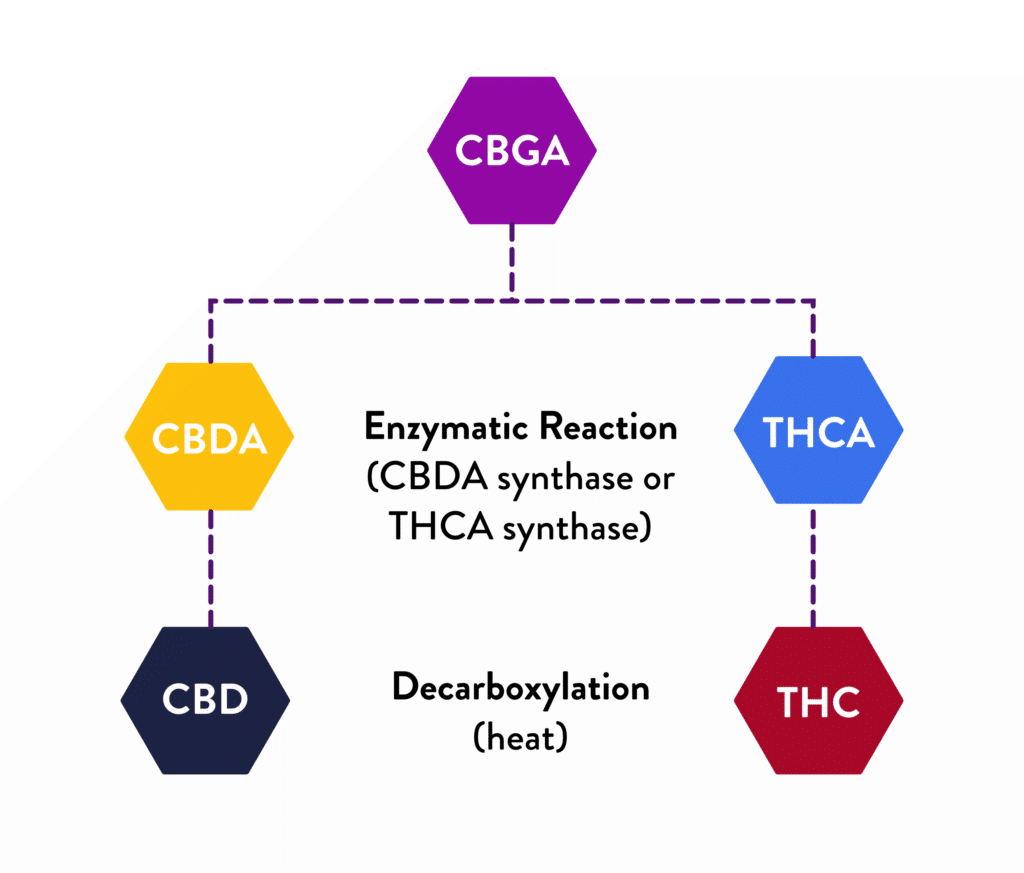By now, you’ve likely heard all about CBD and the many benefits reported by users around the world. Naturally, at this point, our attention starts to turn to the other cannabinoids found in hemp and what uses we may have for them. One of these cannabinoids, CBG, is gaining a lot of steam in the industry as of late, and for a good reason. But what is CBG? How is it different than CBD?
In this article, we’ll go over what CBG is, what it’s used for, the many potential benefits of it, and how it stacks up against its more well-known sibling, CBD.
What is CBG?
CBG (cannabigerol) is a cannabinoid that stems from cannabis. Both marijuana and hemp are classified as cannabis; most of the world’s CBD and CBG products come from the hemp plant due to its low THC content.
CBG is thought to be the “mother” of all cannabinoids. What makes it so unique is that as it ages, it degrades into all other cannabinoids, making it the precursor to cannabinoids like CBD, THC, CBN, and CBC.
Before undergoing carboxylation, cannabinoids are in their acid forms; CBDA > CBD, THCA > THC, CBNA > CBN, and so on. Carboxylation, or heating of these cannabinoids, causes them to change to their active forms.
The process of CBGA degrading into other cannabinoids is a little bit different, however. No heat is necessary to facilitate the process, and it happens on its own naturally.

As the hemp plant matures, the acidic form of CBG is slowly converted by different enzymes in the plant into three major acidic cannabinoids; CBDA, THCA, and CBCA.
What CBGA is left over in the plant is then transformed into CBG through decarboxylation. Naturally, as it degrades into these other cannabinoids, there isn’t much that remains, making it one of the most expensive cannabinoids to harvest and isolate.
The Potential Benefits Of CBG
Cannabigerol is slowly making headway as another highly beneficial cannabinoid, but the research on it is nowhere near that we have on CBD.
Despite the comparatively small amount of research we do have, CBG is one compound that shows massive medical field implications. Here are some of CBG’s potential benefits:
May Slow Tumor Growth
Perhaps one of the biggest potential benefits of CBG is its ability to slow the growth and proliferation of cancer cells.
This 2014 study on CBG and colorectal cancer showed reduced cancer cell growth, promoted programmed cancer cell death, and improved oxidative stress responses.
In another study on cannabinoids and breast cancer, CBG was shown to be effective in both invasiveness reduction and cancerous cell growth inhibition.
Glioblastoma is one of the most deadly forms of brain cancer that kills 95% of patients within 5 years. Through research, it has now been shown to respond positively to cannabinoid treatments. This novel study showed the doubling of the cytotoxic effect on glioblastoma cells by adding CBG to CBD and was more efficient at inducing programmed cell death (apoptosis).
May Help With Bacterial Infections
Like CBD, CBG has anti-bacterial properties as well. Studies suggest that it might be able to treat bacterial infections, most notably through this study on mice and MRSA (staph infection). MRSA is notoriously hard to treat and can be life-threatening in some cases.
May Help Treat Neurodegenerative Diseases
Although this study mainly centers on Huntington’s, a rare neurodegenerative disease, CBG may help in tackling other diseases and disorders like this.
May Reduce Symptoms Of Inflammatory Bowel Disease
Inflammatory Bowel Disease is one that affects millions around the globe and is uncurable. Scientific studies are now showing cannabinoids like CBG and CBD may have positive anti-inflammatory effects on both IBD and IBS (Irritable Bowel Syndrome), potentially opening up new treatments in this area.
Could Help With Anxiety
One of CBD’s most researched benefits is its positive impact on anxiety and anxiety-related disorders. CBG also exhibits anti-anxiety properties and might be able to be used in a similar fashion. This could make it just one more tool in the toolbox for the millions who suffer from anxiety every day.
Could Stimulate Appetite And Reduce Nausea
This may not seem like a huge benefit for some. Still, for those undergoing chemotherapy or other treatments where nausea and loss of appetite are a huge concern, cannabinoids like CBG can vastly improve these people’s quality of life.
While this study deals with rats, and not humans, it still has massive positive implications, and shows that CBG may be able able to stimulate the appetite and reduce nausea.
May Help Treat Glaucoma
Glaucoma is one of the leading causes of blindness globally. Research is showing cannabinoids like CBG might be able to benefit those suffering from it. By reducing the intraocular pressure in the eye, CBG may be able to be used as an effective treatment against this disease.
How Is CBG Different From CBD?
Through research, we’ve learned that CBD has several different applications for the human body, both psychologically and physiologically. The market has expanded to include CBD oils and CBD capsules, CBD topicals, Isolates, Distillates, and more.
Because CBD is directly synthesized from CBG, the two cannabinoids share many similarities. Both are non-psychoactive, and have anti-inflammatory and antioxidant properties, and may be used to treat many of the same things.
CBG has emerged at being able to do a few of these things a little better, however. Studies show CBG may have a significant tumor inhibition effect, making it very promising for cancer treatments. It also may be able to help Glaucoma patients by decreasing the intraocular eye pressure.
CBG also has a leg up on CBD in another way. CBD itself isn’t thought to impact the brain’s CB1 and CB2 receptors directly; instead, it indirectly interacts with the Endocannabinoid System.
CBG is thought to impact these receptors directly, possibly making it more efficient.
What Are The Side Effects Of CBG?
The good news here is that CBG doesn’t appear to have any side effects that we know of. However, this can’t be claimed as definitive as it hasn’t been fully studied in humans yet.
CBG is commonly mixed with CBD, because of how expensive it is. CBD does come with a list of side effects to watch out for; if your oil is a combination, pay attention to these common side effects:
- Nausea
- Diarrhea
- Upset stomach
- Headache
- Dry mouth
- Lowered blood pressure
- Drowsiness/dizziness
- Appetite changes
- Increased anxiety
- May thin the blood
The majority of CBD users don’t report feeling any negative side effects. A few serious ones to watch out for is the lowered blood pressure and blood thinning. Always talk with your doctor before starting any cannabinoid regime. CBD is known to interact with some prescription medications.
Does CBG Get You High?
Like CBD, CBG on its own is a non-psychoactive cannabinoid and will not get you high. Tetrahydrocannabinol (THC) is the compound found in cannabis responsible for the mind-altering effects experienced when ingesting it.
CBG is also known for inhibiting the more negative side effects of THC, like increased anxiety and paranoia, and can decrease its psychoactive effects.
Why Is CBG More Expensive Than CBD?
CBG at the moment is much more expensive than CBD for a few reasons. The actual amount of CBG found in the hemp plant is small, as most of it gets converted into other cannabinoids. What is left over after this process is extremely minimal and costly to extract.
It takes thousands of pounds of biomass to extract and obtain a decent amount of CBG. Compare this to the yield of CBD that manufacturers can get instead from the crop; it leaves many unwilling to spend on it when they can get a much higher amount of CBD.
Many hemp growing companies are currently experimenting with crossbreeding and genetic modifications. These will produce different strains that will yield higher levels of CBG. As these technologies and different strains enter the market, we should see the cost of CBG come down.
One big way to save money on CBG is by making your own CBG oils at home with CBG Isolate. Like CBD Isolate, it also comes in a powdered state and can be combined with a carrier oil and other cannabinoids to make your own.
This is not only cost-effective, as it is much cheaper than buying premade CBG oils; it also gives you the ability to create custom mixtures of different cannabinoids, terpenes, and flavorings.
Final thoughts on CBG
The future of CBG looks bright; however, the field of study will have to increase significantly in order to compare to the CBD and THC. Due to the nature of the compound’s limits in the hemp plant, this may prove challenging.
While the amount of studies and research on cannabigerol is growing, we are nowhere near the point of fully understanding this cannabinoid and the complete impact on the human body.
Want to give CBG a try? Check out our 1:1 tincture with CBD and CBG, or our CBG Isolate if you’re looking to make your own at home.


[…] potential in reducing chronic pain, particularly neuropathic pain. CBG is considered to be more effective at modulating inflammation directly. In contrast, CBD is better at managing pain related to conditions like arthritis or […]
[…] the industry’s talk is primarily around CBD, minor cannabinoids like CBN (cannabinol) and CBG (cannabigerol) are starting to gain more popularity. Cannabichromene in Canada has flown under the radar until […]
[…] (cannabidiol) is a powerful cannabinoid that has been studied for many different uses. CBG (cannabigerol) is another potent cannabinoid also found in hemp plants. There is a question that […]
[…] only can you mix different oils, but with the rise in popularity of other cannabinoids like CBG, CBC, and CBN, it’s actually a great […]
[…] topical products, and capsules. There are even other cannabinoids for sale now as well, like CBG, CBN, and CBC; CBD still remains the powerhouse cannabinoid […]
[…] Cannabigerol (CBG) is a natural compound found in cannabis. While the research on CBG is not as extensive as CBD, the studies suggest it may have powerful anti-inflammatory properties. […]
[…] cannabinoids gaining more traction in the industry as we study them are CBG, CBC, and CBN. Each of these has its own unique benefits that contribute to the overall effects of […]
[…] people are getting confused with all of the new cannabinoids surfacing in Canada, like CBG, CBN, and […]
[…] due to the Entourage Effect. This is where CBD interacts with other terpenes and cannabinoids like CBG, CBN, and CBC to produce a more beneficial effect for your […]
[…] you can buy all sorts of CBD products; oils, topicals, capsules, sublingual strips – even CBG, CBN, and CBC. For many people with chronic aches and pains from everyday life, relief might just […]
[…] Cannabigerol (CBG) is a cannabinoid that, until now, has often been overlooked. However, it has many potential health benefits and is gaining popularity with many Canadians to potentially treat the following conditions: anxiety, chronic pain, relief from arthritis, even depression. Knowing when and how to take CBG oil will help you get the most out of this cannabinoid. […]
[…] anti-inflammatory and pain-killing benefits of not only CBD but also other cannabinoids like THC, CBG, and […]
[…] eye, and recent studies have shown that CBN may reduce the eyeball’s intraocular pressure. CBG also exhibits this effect and can be used in conjunction with CBD to double down on this […]
[…] identified. At the same time, research on some of them like CBD and THC, is vast; others such as CBG and CBN are just starting to be fully […]
[…] now is the perfect opportunity for you to introduce them to another cannabinoid, CBG. While less abundant than other cannabinoids, studies show that CBG may be able to reduce […]